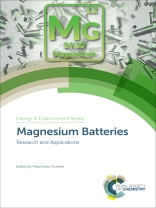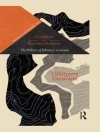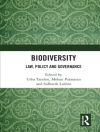The quest for efficient and durable battery technologies is one of the key challenges for enabling the transition to renewable energy economies. Magnesium batteries, and in particular rechargeable non-aqueous systems, are an area of extensive opportunity and intense research. Rechargeable magnesium batteries hold numerous advantages over current lithium-ion batteries, namely the relative abundance of magnesium to lithium and the potential for magnesium batteries to greatly outperform their Li-ion counterparts. Magnesium Batteries comprehensively outlines the scientific and technical challenges in the field, covering anodes, cathodes, electrolytes and particularly promising systems such as the Mg–S cell. Edited by a leading figure in the field of electrochemical energy storage, with contributions from global experts, this book is a vital resource for students and researchers at all levels. Whether entering into the subject for the first time or extending their knowledge of battery materials across chemistry, physics, energy, engineering and materials science this book provides an ideal reference for anyone interested in the state-of-the-art and future of magnesium batteries.
สารบัญ
Motivation for a Magnesium Battery; Non-aqueous Electrolytes for Mg Batteries; Solid-state Magnesium-ion Conductors; Theoretical Modelling of Multivalent Ions in Inorganic Hosts; Anode Materials for Rechargeable Mg Batteries; Mg Stripping and Plating at Magnesium Metal and Intermetallic Anodes; Insertion Electrodes for Magnesium Batteries: Intercalation and Conversion; High Energy Density Insertion Cathode Materials; Organic Compounds as Electrodes for Rechargeable Mg Batteries; Magnesium–Sulfur Batteries; Mg–Li Dual-cation Batteries; Aqueous Mg Batteries; Life Cycle Analysis of a Magnesium–Sulfur Battery
เกี่ยวกับผู้แต่ง
Maximilian Fichtner is a full professor (W3) for Solid State Chemistry at the Ulm University and head of Materials-I at the Helmholtz-Institute Ulm for Electrochemical Storage (HIU), a German Center of Excellence for Battery Research, with approx. 120 employees. Since 2015 he is also Executive Director of the institute. His current research interest is novel principles for energy storage and the related materials in insertion and conversion-type battery systems. Recent work has focused on the new class of Li rich materials with rocksalt structure, anionic shuttles, magnesium batteries, and organic electrode materials.












